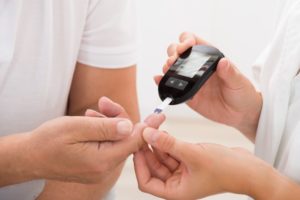Diabetes and Oral Health: Does High Blood Sugar Lead to an Unhealthy Smile?
November 21, 2019
 Right now, there are about 8.1 million people who have diabetes and don’t even realize it. As a result, their uncontrolled blood sugar levels could be causing all sorts of damage in their bodies – and it could even be putting their teeth at risk! There’s a very real connection between diabetes and certain oral health problems – and your dentist in East Islip is here to tell you everything you need to know about this link in order to protect your pearly whites.
Right now, there are about 8.1 million people who have diabetes and don’t even realize it. As a result, their uncontrolled blood sugar levels could be causing all sorts of damage in their bodies – and it could even be putting their teeth at risk! There’s a very real connection between diabetes and certain oral health problems – and your dentist in East Islip is here to tell you everything you need to know about this link in order to protect your pearly whites.
Diabetes and Oral Health: A Surprising Link
When you have diabetes, your body isn’t able to correctly process the sugar it uses for energy. Either the body isn’t making enough of the insulin responsible for carrying the sugar into the cells, or the cells themselves just stopped responding to the insulin. In either case, this leaves the sugar in your bloodstream, where it could damage important blood vessels and put you at risk for heart disease, vision problems, and other issues.
What does any of this have to do with your mouth? High blood sugar levels have many side effects that could threaten your teeth and gums. For example:
- Higher blood sugar means more sugars and starches for oral bacteria to feed on and form plaque as a result. Plaque buildup leads to tooth decay and gum disease.
- Uncontrolled diabetes hurts the immune system, leaving you more vulnerable to severe gum disease, which could cause your teeth to loosen or even fall out.
- People with diabetes might produce less saliva, leading to dry mouth. Since saliva is important for removing bacteria and food particles from your teeth, dry mouth makes cavities and other oral health issues more likely.
How to Avoid Oral Health Issues with Diabetes
If you don’t want to make an unscheduled trip to your emergency dentist in East Islip, you need to make sure that both your diabetes and your oral hygiene stay well under control. Be wary of the early warning signs of diabetes, including frequent urination, constant hunger, blurry vision, recurring tiredness, or wounds that heal slowly. Call your doctor if you notice any concerning symptoms; if you do have diabetes, it should be addressed right away to minimize the long-term damage.
Meanwhile, you need to make sure you’re practicing proper dental care by:
- Brushing at least two times a day (or, ideally, after meals and snacks)
- Flossing to get rid of any plaque in the spaces between your teeth
- Checking for early signs of gum disease such as red, swollen, or bleeding gums
- Scheduling a dental checkup in East Islip
By being aware of the risks and taking the right precautions, you can keep your smile safe while preventing diabetes from getting out of control.
About the Practice
At East Islip Dental Care, our team of expert dentists is available 7 days a week to provide high quality dental care, whether you need a regular checkup to remove plaque from your teeth or periodontal therapy to keep your gums healthy. To schedule an appointment and learn more about the effects diabetes could be having on your smile, visit our website or call (631) 581-8600.
No Comments
No comments yet.
RSS feed for comments on this post.
Sorry, the comment form is closed at this time.


